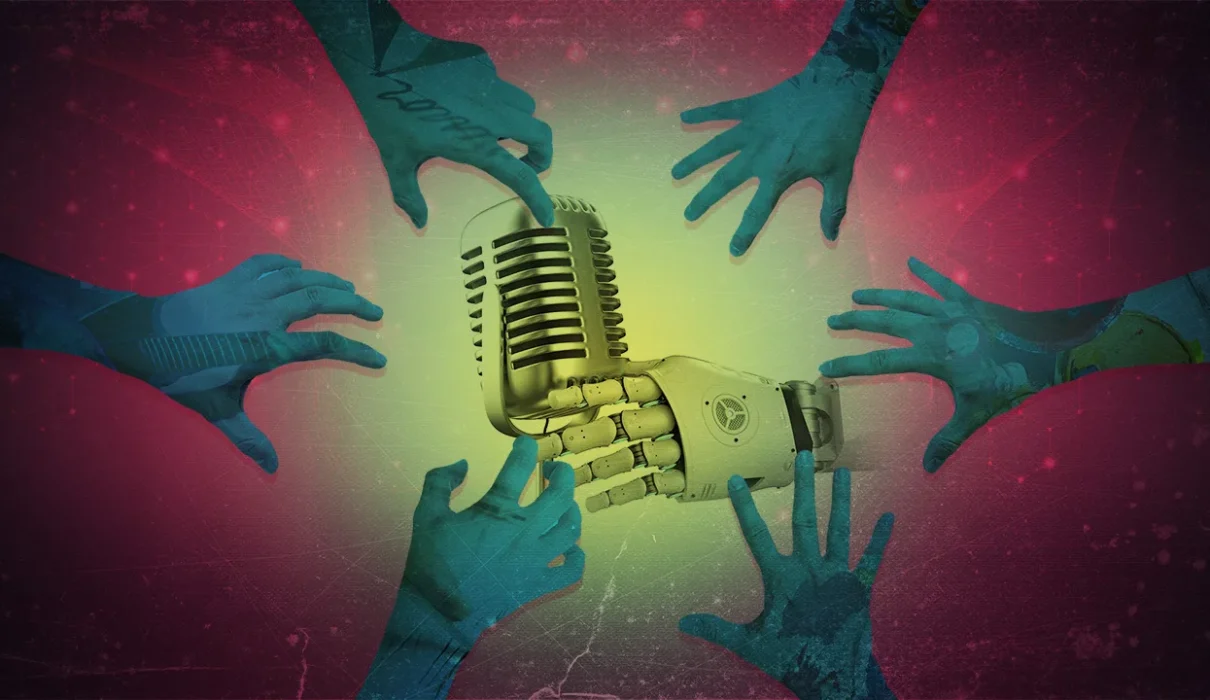MANILA, Philippines – The advancement of artificial intelligence has led to powerful programs like ChatGPT which people tinker with to create things that could help them in their daily lives. In TikTok, users are now harnessing the power of AI to create song covers using the voices of personalities they love.
Song covers use AI-generated voices of famous singers like Justin Bieber, Taylor Swift, and Lady Gaga, or voice actors of cartoon characters like Plankton from Nickelodeon’s Spongebob Squarepants and Finn from Cartoon Network’s Adventure Time, which have garnered hundreds of thousands of views on the platform.
One AI song cover, posted by TikTok user @forhonorlad, used an AI-generated voice of singer Frank Sinatra for a song cover of Dua Lipa’s “Levitating” that has over 13 million views. Another cover, posted by user @ghostdude00, features an AI-generated voice of Plankton singing the song “Beggin” by Måneskin. It has over 11 million views.
The trend is not just limited to American personalities. TikTok user @jereeemiaaah posted an AI song cover that used Filipino celebrity Willie Revillame’s voice for the Russian song “You and I” by Xcho which has over 1.6 million views. An AI-generated voice of Jessica Soho was also used in a cover of “SuperShy” by NewJeans which has over 650,000 views.
AI accessible to everyone
There are several websites where AI song covers can be created. The websites Voicify.ai and topmediai.com offer paid services to generate an AI song cover. There are also websites like musicfy.lol and covers.ai that offer free trials to people who just want to try creating AI-generated content once.
To create an AI-generated song cover, these websites require a user to upload a file, which could be in mp3, wav, m4a, mp4, and other audio formats. There’s also an option for the user to paste a YouTube link, such as in voicify.ai, covers.ai, and musicfy.lol, which it will use to create an AI-generated song cover.
Users of these websites also need to choose which voice should be used to create a song cover of the song they uploaded or the YouTube video they picked. In covers.ai, people can even use AI-generated voices of Filipino personalities like Willie Revillame and Vic Sotto, as well as presidents like Philippine President Ferdinand Marcos Jr. and Indonesia President Joko Widodo.
Musicfy.lol has a collection of artists’ voices that it says are “copyright free” which the user could choose from. Unlike other websites, voices of artists and other personalities that are not in their collection can’t be used to generate song covers in musicfy.lol
After these steps, most of these websites will ask for the user’s email address where the AI-generated song cover will be sent.
Fear of the ‘wild west’ of AI
Pio Dumayas, lead vocalist of Filipino band Lola Amour, told Rappler during a Q&A segment of Rappler Live Jam that the trend is “a bit scary” because the public “can do it to anyone.” He also pointed out that there are “not a lot of regulations” on using AI to generate content.
“If you choose to fear it as something that would take your job, maybe it will take your job. But maybe adapt and think of ways that you can co-exist as an artist with AI and push your artistry forward through the use of AI…It’s just a tool,” Dumayas said.
Jeremy Shada, the voice of Finn from Cartoon Network’s Adventure Time, told Rappler in an email that he made a TikTok video where he gave his opinions on the topic. Shada’s voice has been used in several AI-generated song covers, one of which is of the song Hey Soul Sister by Train posted by TikTok user @ai.music6 that has 1.7 million views.
In the video, Shada said that though he understands that a lot of people are “just having fun with AI right now,” fear still arises in people like him who make “an entire living” with their voice and likeness.
“That would totally affect our livelihood and it’s kinda scary when someone can take your voice and make it sound very real, sing whatever the person wants it to. Not a huge fan of that and I think we can all see the dangers of that and where that can lead,” Shada said.
Shada also said in the video that the use of AI to generate content using the likeness of people, which he calls “the wild west of AI,” is part of “why actors are striking,” referring to the Screen Actors Guild-American Federation of Television and Radio Artists (SAG-AFTRA) strike in the United States of America that started last July.
Part of the reason for SAG-AFTRA’s strike is to fight for the control of their digital replicas.
SAG-AFTRA chief negotiator Duncan Crabtree-Ireland said in a press conference that actors now “face an existential threat to their livelihoods with the rise of generative AI technology.”
“The studios have not offered something that guarantees they will have control over the use of their image, of their likeness, or their voice going forward,” Crabtree-Ireland said in an MSNBC interview.
In his video, Shada also gave his opinion on the lack of control over one’s identity in creating AI-generated content.
“I don’t think anyone wants an AI version of them doing anything that they don’t want them to do or that they would do themselves,” Shada said.


